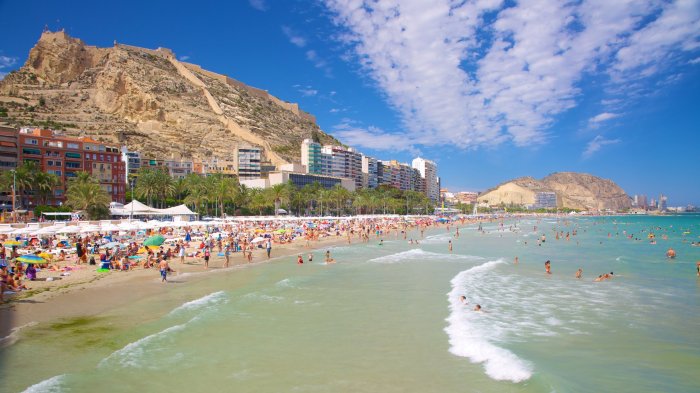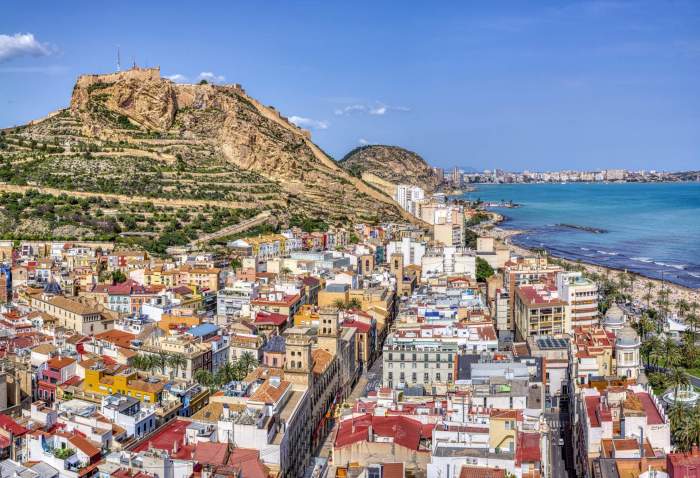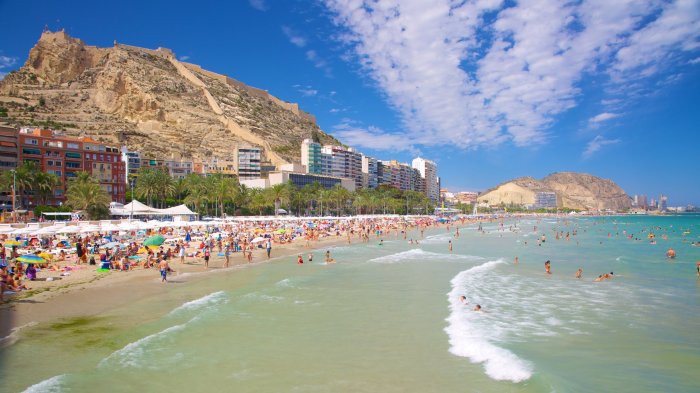Alicante, a vibrant city nestled on the Mediterranean coast of Spain, captivates visitors with its rich history, vibrant culture, and thriving economy. From ancient ruins to modern skyscrapers, Alicante offers a captivating blend of the past and present, making it an unforgettable destination.
With its stunning coastline, picturesque mountains, and year-round sunshine, Alicante provides a breathtaking backdrop for exploration and relaxation. The city’s historical legacy is evident in its ancient castle, medieval churches, and museums, offering a glimpse into Alicante’s fascinating past.
Alicante





Alicante is a captivating province located in the southeastern region of Spain, boasting a prime position on the sun-kissed Mediterranean coast. The province forms part of the autonomous community of Valencia and is renowned for its picturesque coastline, verdant mountains, and charming inland areas.
Geographical Overview
Alicante is strategically situated on the eastern coast of Spain, facing the Mediterranean Sea. It is bordered by the provinces of Murcia to the south, Albacete to the west, and Valencia to the north. The province encompasses an area of approximately 5,816 square kilometers and is home to a diverse landscape that ranges from sandy beaches to rugged mountains.
The coastline of Alicante stretches for over 244 kilometers and is characterized by pristine beaches, dramatic cliffs, and hidden coves. The province’s interior is marked by a series of mountain ranges, including the Sierra de Mariola, Sierra de Aitana, and Sierra de Crevillente. These mountains provide a breathtaking backdrop to the region and offer opportunities for hiking, cycling, and other outdoor activities.
Alicante enjoys a Mediterranean climate, with warm, dry summers and mild, wet winters. Average temperatures in the summer months range from 25 to 30 degrees Celsius, while winter temperatures typically hover around 10 to 15 degrees Celsius. The province receives an average of around 300 millimeters of rainfall annually, with most precipitation occurring during the winter months. Alicante also boasts an abundance of sunshine hours, with an average of over 3,000 hours per year.
Alicante





Historical Significance
Alicante’s historical significance spans centuries, leaving an indelible mark on the city’s identity. From its ancient origins to its present-day status, Alicante has witnessed a rich tapestry of civilizations and events.
In ancient times, the area was inhabited by the Iberians, who established a settlement known as Lucentum. The city later fell under Roman rule, becoming a thriving port known as Lucentum. The Romans left a lasting legacy, including the ruins of an amphitheater and an aqueduct.
During the Middle Ages, Alicante was conquered by the Moors, who ruled for several centuries. They fortified the city and built the Castillo de Santa Barbara, which remains a prominent landmark today. After the Reconquista, Alicante became a major port and commercial center.
In the 19th century, Alicante played a key role in the Spanish Civil War. The city was heavily bombed during the conflict, but it eventually emerged as a symbol of resilience.
Today, Alicante is a vibrant city with a rich architectural and cultural heritage. Its castles, churches, and museums tell the story of its past, while its modern amenities and bustling atmosphere reflect its present-day status as a major tourist destination.
Alicante





Cultural and Artistic Attractions
Alicante boasts a vibrant cultural scene, offering a diverse range of attractions that cater to different tastes and preferences.
Alicante, a vibrant coastal city in Spain, offers a wealth of attractions. From sun-soaked beaches to historic landmarks, there’s something for every traveler. To plan your perfect Alicante itinerary, consider using a travel itinerary template. This tool can help you organize your activities, accommodations, and transportation, ensuring a smooth and memorable trip.
As you explore Alicante, be sure to visit the Santa Barbara Castle, stroll along the Explanada de España, and indulge in the city’s renowned gastronomy.
The city is home to several theaters, including the Teatro Principal de Alicante, which hosts a variety of performances such as plays, concerts, and dance shows. The Aula de Cultura de la Universidad de Alicante also hosts cultural events, including exhibitions, conferences, and workshops.
Alicante has a thriving music scene, with venues like the Auditorio de la Diputación de Alicante and the Sala Babel hosting live concerts featuring local and international artists. The city also has several music festivals throughout the year, including the Alicante Jazz Festival and the Festival de Música Clásica de Alicante.
Art enthusiasts will find a number of art galleries in Alicante, showcasing both contemporary and traditional art. The Museo de Arte Contemporáneo de Alicante (MACA) houses a collection of modern and contemporary art, while the Museo de Bellas Artes Gravina (MUBAG) displays works from the 16th to the 20th centuries.
Alicante’s cultural offerings extend beyond theaters, music venues, and art galleries. The city is also known for its traditional festivals and events.
The Bonfires of San Juan, celebrated on the night of June 23rd, is one of the most popular festivals in Alicante. Giant bonfires are built on the beaches, and people gather to celebrate with music, food, and fireworks.
The Moors and Christians Festival, held in late July, commemorates the reconquest of Alicante from the Moors in the 13th century. The festival features parades, mock battles, and other colorful events.
Alicante’s culinary offerings are as diverse as its cultural scene. The city is known for its fresh seafood, including dishes like arroz a banda (rice with fish and seafood) and fideuà (noodle paella). Alicante is also home to several vineyards, producing renowned wines such as the Fondillón de Alicante.
Alicante, a vibrant coastal city in Spain, offers a captivating blend of history and culture. For those seeking a deeper exploration of Europe’s rich heritage, cultural tours in Europe provide an immersive experience. These tours delve into the art, architecture, and traditions of various European destinations, enriching one’s understanding of Alicante’s own cultural tapestry.
Alicante: Economic Activities and Industries

Alicante boasts a diverse economic landscape, with key industries driving its growth and development. The city serves as a commercial and tourist hub, attracting businesses and visitors alike.
Major Industries and Sectors, Alicante
- Tourism: Alicante’s stunning beaches, historic landmarks, and vibrant nightlife make it a popular destination for both domestic and international tourists. The industry accounts for a significant portion of the city’s GDP.
- Trade and Commerce: Alicante is a major port city, facilitating trade with countries across the Mediterranean Sea. It also serves as a hub for distribution and logistics.
- Manufacturing: Alicante has a strong manufacturing sector, specializing in industries such as footwear, textiles, and food processing.
- Technology: The city is home to a growing technology sector, with a focus on software development and innovation.
- Agriculture: The surrounding region is known for its fertile lands, supporting agriculture, particularly the cultivation of fruits and vegetables.
Commercial and Tourist Hub
Alicante’s strategic location on the Mediterranean coast has made it a vital commercial and tourist hub. The city’s port facilitates the import and export of goods, while its airport connects it to major cities in Europe and beyond. Alicante’s tourism industry is thriving, with visitors drawn to its beaches, cultural attractions, and lively atmosphere.
Investment and Business Development
Alicante offers attractive opportunities for investment and business development. The city’s strong economic growth, skilled workforce, and favorable business environment make it an ideal location for both domestic and international companies. The government provides incentives and support for businesses, encouraging innovation and job creation.
Alicante





Alicante, a captivating coastal city nestled in southeastern Spain, boasts a vibrant tapestry of history, culture, and economic dynamism. From its sun-kissed beaches to its bustling urban center, Alicante offers a captivating blend of modern amenities and traditional charm.
Alicante: Transportation and Infrastructure
Alicante’s strategic location on the Mediterranean coast has made it a vital transportation hub for centuries. The city is well-connected by air, sea, and land, providing seamless access to regional and international destinations.
Air Transportation: Alicante-Elche Airport (ALC) is the main gateway to the city, handling millions of passengers annually. The airport offers a wide range of domestic and international flights, connecting Alicante to major cities across Europe and beyond.
Sea Transportation: The Port of Alicante is a bustling maritime hub, handling both passenger and cargo traffic. Regular ferry services connect Alicante to the nearby islands of Tabarca and Ibiza, while cruise ships make frequent stops in the city.
Alicante is a beautiful coastal city in Spain with many stunning beaches. If you’re looking for a change of scenery, consider exploring the best beaches in the Caribbean. These tropical paradises offer crystal-clear waters, white-sand beaches, and plenty of sunshine.
After your Caribbean adventure, return to Alicante to experience its rich history, vibrant culture, and delicious cuisine.
Public Transportation: Alicante has a comprehensive public transportation system that includes buses, trams, and a light rail network. The city’s modern tram system provides efficient and affordable connections to the airport, city center, and surrounding areas.
Infrastructure: Alicante’s infrastructure is well-developed, with a network of modern roads, bridges, and utilities. The city’s extensive road network connects it to major highways and the rest of Spain. Alicante also boasts a reliable water and electricity supply, ensuring the smooth functioning of its economy and daily life.
Future Plans and Developments: Alicante is continuously investing in its transportation and infrastructure to meet the growing demands of its population and economy. Plans are underway to expand the airport’s capacity and improve connectivity to the city center. The city is also exploring the development of a high-speed rail line to connect Alicante to Madrid and other major cities in Spain.
Alicante





Alicante, a vibrant city on the southeastern coast of Spain, boasts a diverse population and a rich social fabric.
Demographics and Social Structure
Alicante has a population of around 330,000, making it the second-largest city in the Valencian Community. The city’s population is relatively young, with a median age of 41.3 years. The population is also highly diverse, with a significant immigrant population from other parts of Spain, as well as from other countries such as Morocco, Romania, and the United Kingdom.
The social structure of Alicante is characterized by a high level of education and a relatively equal distribution of income. The city has several universities and research institutions, which contribute to its high level of human capital. The city also has a strong middle class, with a significant number of people working in the service sector.
Despite its overall prosperity, Alicante faces some social challenges. These include poverty, social exclusion, and a lack of affordable housing. The city is also home to a large number of undocumented immigrants, who often face discrimination and exploitation.
Despite these challenges, Alicante remains a vibrant and welcoming city. The city’s strong social fabric and commitment to social justice provide a foundation for addressing these challenges and building a more inclusive and equitable society.
Outcome Summary: Alicante
As we bid farewell to Alicante, its allure lingers in our hearts. The city’s captivating blend of history, culture, and economic vitality has left an indelible mark. Whether you seek sun-soaked beaches, historical wonders, or vibrant urban experiences, Alicante promises an unforgettable journey that will ignite your senses and create memories to cherish.
FAQ Guide
Is Alicante a good place to visit?
Absolutely! Alicante offers a wealth of attractions, from stunning beaches and historical landmarks to vibrant cultural experiences and a thriving culinary scene.
What is the best time to visit Alicante?
Alicante enjoys a Mediterranean climate with warm, sunny summers and mild winters. The best time to visit is during the shoulder seasons (April-May and September-October) when the weather is pleasant and the crowds are smaller.
What are some must-see attractions in Alicante?
Don’t miss the Santa Barbara Castle, the Explanada de España promenade, the Postiguet Beach, and the Gravina Museum of Fine Arts. For a unique experience, take a boat trip to the nearby Tabarca Island.
